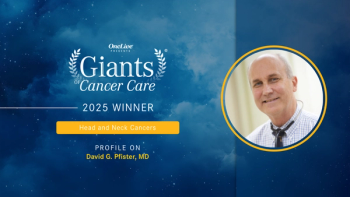
Locoregionally Advanced HNSCC
Transcript:Ezra Cohen, MD: So, we’ve covered a lot of ground regarding the biology of head and neck cancer, and the prognostic implications of different elements in a patient. Let’s now move to talk about the multidisciplinary treatment of patients with advanced, and we’re talking primarily about locoregionally advanced, head and neck squamous cell carcinoma. First, Kevin, tell us a little bit about the multimodality therapy of these patients. Is it important? Do we routinely do it? And tell us about your personal experience as well.
Kevin Harrington, MD, PhD: I think the key to the most effective multimodality therapy is to work within a well-convened multidisciplinary team. Because no individual who manages patients with head and neck cancer is capable of making decisions accurately about the surgical treatment, the radiotherapy, and the cytotoxic chemotherapy, and now the biologic therapies on their own. And so, it’s important that we have a multimodality team involved in this.
So, now in the United Kingdom, and I suspect throughout most of the world, it is compulsory to manage patients within a multidisciplinary team setting. I think what we do is we discuss patients in great detail and we make appropriate decisions whereby we select either surgery plus or minus postoperative radiotherapy, chemoradiation, or a nonsurgical approach. And as a result of those decisions, I think we’re beginning to see significant improvements and outcomes for patients. Patients are being spared inappropriate treatments. For instance, patients who should not be operated on are spared those operations because they may then just simply go on and have chemotherapy and radiation therapy, and vice versa. Patients who have surgically curable disease should be identified and offered that because the postoperative treatment may be gentler and have better functional outcomes for those patients than primary nonsurgical treatment up front.
The practice in the United Kingdom, and I think throughout much of the world, has now completely been revolutionized by this approach, and patients are deriving significant benefit from these treatments. Alongside that there has been an incremental improvement in the techniques involved in providing surgical care, including such techniques which I am sure we’ll discuss later—transoral robotic surgery and laser resection of tumors. Radiotherapy technology has improved significantly, with a view to reducing morbidity. And in addition, the use of concomitant chemotherapy in the appropriate groups has become the standard of care. So, I think we’ve seen real advantages for patients as a result of that.
Ezra Cohen, MD: It’s highlighting, really, the importance of a multidisciplinary approach. Viktor, tell me what goes on at your center.
Viktor Grünwald, MD: I think the selection of patients is really key, and that’s something that has evolved over the past years. So, we spare toxicity wherever it’s possible, and certainly this is the distinction between surgery and primary radiochemotherapy. It’s really key. What we’ve also implemented then is that once you have your high-risk population identified, say they had surgery initially and lymph nodal disease that spread beyond the capsule, there would be intensified treatment for those patients. So, we use radiochemotherapy for them. There are good data to support that kind of notion. More and more, we are getting down to a subgroup of patients that need intensified treatment. Those that do not have this multimodality approach, having all the different items in place for delivering the therapy to these patients is important. And I think it comes from a good reason because of those long-term results that we talk about, and the fact that the combination is more toxic, it has long-term effects on outcome in these patients. So, I think it’s very important to select the right patient for appropriate treatment.
Tanguy Y. Seiwert, MD: Can I challenge this very briefly? I couldn’t agree more with my colleagues Kevin and Viktor about the importance. And the one point I would like to add is it’s very clear that centers that do high volumes of head and neck cancer care, specialized centers, have better outcomes. So, I think head and neck cancer patients should be treated, especially for the curative intent setting, in large centers with extensive experience.
Ezra Cohen, MD: And Tanguy, just to follow up on that, I have a feeling that those larger centers, in their multidisciplinary tumor board, have other individuals in the room that help to inform treatment. So, we talked about medical oncologists and surgeons. We talked about radiation oncologists. But who else is at your tumor board that’s helping to manage the patient?
Tanguy Y. Seiwert, MD: I think it’s a great point. It takes, literally, a large team to do this because these patients get quite sick. We’re treating them for cure, but it takes a lot of effort supporting patients through the very aggressive treatment at times, and you have severe side effects: mucositis, weight loss, and many other implications from radiation, chemotherapy, and surgery.
We have nutritional support. We have physical therapy. We have speech and swallowing. The dentists are involved. Not all of them always show up to the tumor board, but oftentimes there are representatives. The room is full, the room is packed when we have a tumor board every week, and it makes a difference. I think that’s part of the good outcomes—that everybody works together. You don’t want to start chemoradiation and then halfway through, the patient’s emaciated and cannot continue treatment. I think it takes that level of experience, being comfortable with toxicities, to get the patient through the treatment and ultimately achieve a cure.
Ezra Cohen, MD: And I have to say, there’s something about everybody being in the room at the same time, reviewing the case, looking at the scans, looking at the pathology, and really having that exchange that I think is critical to those early management decisions that really can make the difference between a good outcome, the outcome you want, and one that you don’t. I couldn’t agree with you more.
Tanguy Y. Seiwert, MD: And there’s also a trend to go even further where even at the initial visit, you have multidisciplinary clinics where all three specialties actually come together. It doesn’t have to be this way, but it oftentimes is beneficial. It is also beneficial for the patient if you have this initial discussion right away between different specialties who offer different insight into the treatment.
Kevin Harrington, MD, PhD: And I think it’s important to recognize the fact that you might get the false impression that we present a case and everyone agrees with the management. That’s definitely not the case.
Ezra Cohen, MD: No.
Tanguy Y. Seiwert, MD: We don’t always agree.
Kevin Harrington, MD, PhD: I think it’s really important, and I think it’s important for the patients to know. The way we run our practice is that we will have the multidisciplinary tumor board and then we will follow it with a multidisciplinary clinic. And quite often, we will present the patient with the fact that there has been some disagreement. The consensus recommendation has been for them to go forward for one form of treatment or another. And the patient then becomes part of that decision-making process as well. Of course, what often happens is that the patient will take the advice of the multidisciplinary team. But, frequently, the decision or the recommendation is out of kilter with what they themselves may want to do, and that, of course, then may change the management decision.
Ezra Cohen, MD: It’s a very good point Kevin, and it’s really interesting the way you approach it.
Transcript Edited for Clarity


































